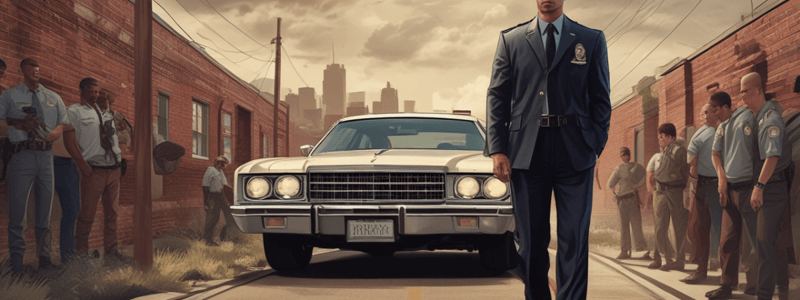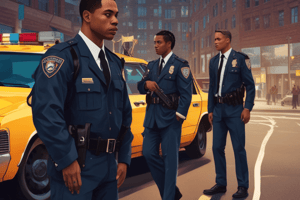Podcast
Questions and Answers
What is one of the factors that officers should consider when interrogating a juvenile?
What is one of the factors that officers should consider when interrogating a juvenile?
- The juvenile's social status
- The juvenile's familiarity with the language used in the interrogation (correct)
- The officer's experience with interrogations
- The officer's educational background
What should officers do if a juvenile cannot write their own statement?
What should officers do if a juvenile cannot write their own statement?
- Do not request a written statement at all
- Call a supervisor for guidance (correct)
- Request a written statement from the juvenile's parent or guardian
- Write the statement for the juvenile without approval
Why should officers allow juveniles to attempt to write their own statement?
Why should officers allow juveniles to attempt to write their own statement?
- To assess the juvenile's ability to read and/or write (correct)
- To intimidate the juvenile into confessing
- To ensure the juvenile's parents are present
- To make the interrogation process more efficient
What is one of the indicators of a juvenile's capacity to make a statement that officers should include in the Supplementary Report?
What is one of the indicators of a juvenile's capacity to make a statement that officers should include in the Supplementary Report?
What is one of the considerations that officers should take into account when interrogating a juvenile?
What is one of the considerations that officers should take into account when interrogating a juvenile?
Who can write a statement for a juvenile if they are unable to do so themselves?
Who can write a statement for a juvenile if they are unable to do so themselves?
What is the primary purpose of the Miranda Warnings?
What is the primary purpose of the Miranda Warnings?
When must officers complete the OPD Form 17A (Juvenile Rights Advisory)?
When must officers complete the OPD Form 17A (Juvenile Rights Advisory)?
How must the juvenile articulate their desire to invoke their right to remain silent?
How must the juvenile articulate their desire to invoke their right to remain silent?
What is the purpose of the second advisory in situations where the juvenile initially refuses to talk?
What is the purpose of the second advisory in situations where the juvenile initially refuses to talk?
What factors contribute to the admissibility of a juvenile's statement?
What factors contribute to the admissibility of a juvenile's statement?
What is the primary consideration for officers when determining whether to allow a parent, guardian, or custodian to be present during the interrogation?
What is the primary consideration for officers when determining whether to allow a parent, guardian, or custodian to be present during the interrogation?
What is the purpose of explaining the OPD's procedures to the juvenile and their parent, guardian, or custodian?
What is the purpose of explaining the OPD's procedures to the juvenile and their parent, guardian, or custodian?
What is the officer's responsibility regarding the juvenile's personal needs during the interrogation?
What is the officer's responsibility regarding the juvenile's personal needs during the interrogation?
What is the consequence of not meeting the requirements for questioning a suspect after they have invoked their Miranda Rights?
What is the consequence of not meeting the requirements for questioning a suspect after they have invoked their Miranda Rights?
What is the purpose of limiting the length of the interrogation and the number of officers participating?
What is the purpose of limiting the length of the interrogation and the number of officers participating?
What is the primary consideration of the Omaha Police Department when conducting eyewitness identifications and interrogations with juveniles?
What is the primary consideration of the Omaha Police Department when conducting eyewitness identifications and interrogations with juveniles?
At what age can officers conduct eyewitness identifications and interrogations with juveniles?
At what age can officers conduct eyewitness identifications and interrogations with juveniles?
What type of lineup is permitted to identify a juvenile suspect?
What type of lineup is permitted to identify a juvenile suspect?
What is the purpose of OPD Form 17A (Juvenile Rights Advisory)?
What is the purpose of OPD Form 17A (Juvenile Rights Advisory)?
What is the exception to the policy of not conducting eyewitness identifications or interrogations with juveniles younger than eleven (11)?
What is the exception to the policy of not conducting eyewitness identifications or interrogations with juveniles younger than eleven (11)?
What policy does the OPD follow when conducting eyewitness identifications with juveniles?
What policy does the OPD follow when conducting eyewitness identifications with juveniles?
Flashcards are hidden until you start studying
Study Notes
Interrogation of Juveniles
- Officers must consider the juvenile's maturity level and understanding during interrogation.
- If a juvenile cannot write their own statement, an officer or appropriate adult should prepare it on their behalf.
- Allowing juveniles to write their own statements provides them an opportunity for self-expression and clarity.
- One indicator of a juvenile's capacity to make a statement is their ability to comprehend the questions posed to them, which should be noted in the Supplementary Report.
- Officers should consider the emotional state of the juvenile and the potential influence of coercion or pressure during interrogation.
Statements and Rights
- A family member or legal guardian can write a statement for a juvenile if they are unable to do so themselves.
- The primary purpose of Miranda Warnings is to inform individuals of their rights before interrogation, specifically the right to remain silent and to have legal counsel.
- Officers must complete the OPD Form 17A (Juvenile Rights Advisory) prior to any questioning of the juvenile.
- A juvenile must explicitly state their desire to invoke the right to remain silent through clear verbal communication.
- The second advisory serves to reaffirm a juvenile's rights when they initially refuse to talk, ensuring they understand their choices.
Factors Affecting Admissibility
- Factors influencing the admissibility of a juvenile's statement include voluntariness, comprehension of rights, and presence of an adult.
- The primary consideration for allowing a parent, guardian, or custodian during interrogation is the need to ensure the juvenile feels supported and understands the situation.
- Explaining OPD’s procedures to the juvenile and their guardian helps establish transparency and eases anxiety.
- Officers have a responsibility to consider and address the personal needs of the juvenile during interrogation, including breaks and emotional support.
Consequences and Best Practices
- If requirements for questioning after invoking Miranda Rights are not met, any obtained statements may be inadmissible in court.
- Limiting the interrogation length and number of officers helps reduce the pressure on the juvenile and minimizes intimidation.
- The Omaha Police Department emphasizes the need for sensitivity and careful handling during eyewitness identifications and interrogations of juveniles.
- Officers can conduct eyewitness identifications and interrogations with juveniles as young as 11 years old.
- A photo lineup is typically permitted for identifying a juvenile suspect rather than a physical lineup.
- OPD Form 17A (Juvenile Rights Advisory) is essential for protecting juvenile rights and ensuring they are informed of their legal options.
- The exception to policy for conducting interrogations with juveniles younger than eleven allows for situations where immediate safety concerns arise.
- The OPD follows a policy of fair treatment and developmentally appropriate practices during eyewitness identifications for juveniles.
Studying That Suits You
Use AI to generate personalized quizzes and flashcards to suit your learning preferences.





